Pearlitic ductile iron (also known as nodular cast iron) exhibits several mechanical properties that make it well-suited for rolling applications in industries such as steel production, metal forming, and paper manufacturing. Here are some key mechanical properties:
High Strength and Hardness:
Pearlitic ductile iron roll typically has a good balance of strength and hardness, making it capable of withstanding the high pressures and stresses encountered in rolling processes.
Good Wear Resistance:
Due to its microstructure, which consists of nodular graphite in a pearlitic matrix, pearlitic ductile iron offers excellent wear resistance. This property is crucial in rolling applications where the rolls are subjected to abrasion and frictional forces.
Toughness and Ductility:
Despite its high hardness, pearlitic ductile iron retains significant toughness and ductility. This toughness helps prevent catastrophic failure and allows the rolls to absorb impact loads during rolling operations.
Fatigue Resistance:

Pearlitic ductile iron exhibits good fatigue resistance, which is essential for enduring the repetitive loading cycles experienced in continuous rolling processes.
Thermal Conductivity:
The thermal conductivity of pearlitic ductile iron is another advantageous property. It helps in efficient heat dissipation during rolling, preventing excessive heat buildup that could otherwise affect roll performance and durability.
Machinability and Workability:
Pearlitic ductile iron is relatively easy to machine and work with during manufacturing processes, allowing for the production of complex roll designs and configurations tailored to specific rolling applications.
These mechanical properties make pearlitic ductile iron a preferred material for rolling applications where durability, wear resistance, and reliability under high mechanical stresses are critical requirements.